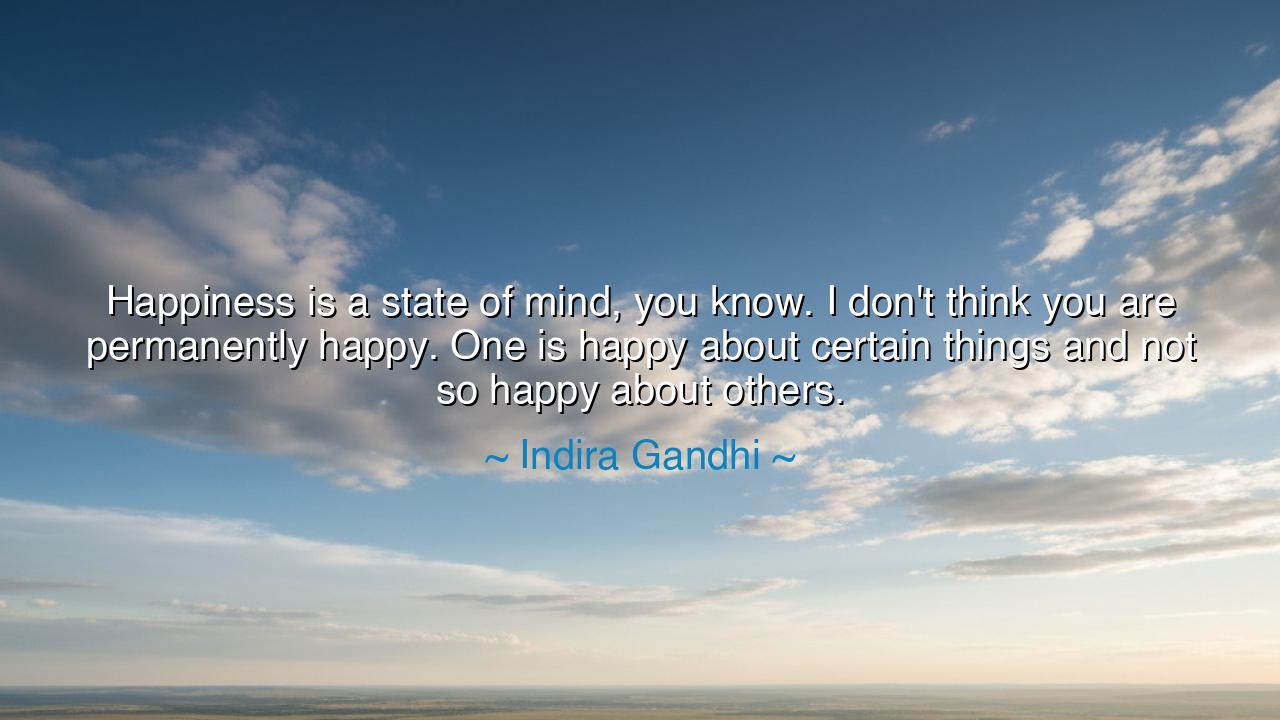
Happiness is a state of mind, you know. I don't think you are
Happiness is a state of mind, you know. I don't think you are permanently happy. One is happy about certain things and not so happy about others.






When Indira Gandhi, the iron-willed leader of India, said, “Happiness is a state of mind, you know. I don't think you are permanently happy. One is happy about certain things and not so happy about others,” she spoke as one who had lived through triumph and tragedy, victory and loss, power and solitude. Her words carry the tempered wisdom of experience — the understanding that happiness, like the seasons, comes and goes, and that it lives not in the circumstances of life but in the mind that receives them. To those who seek everlasting joy in possessions, success, or praise, she offers a quiet truth: that life is a tapestry woven of both joy and sorrow, and the wise heart learns to accept both without despair.
Born into a family that carried the destiny of a nation, Indira Gandhi knew both the glory and the burden of greatness. Her childhood was shaped by the freedom struggle of India, her youth by exile and loss, her adulthood by leadership that demanded sacrifice. In such a life, there was little room for idle happiness — and yet, she learned to find peace in moments of clarity, in the strength of purpose, in the flow of work well done. Her words are not those of a cynic, but of a realist with a philosopher’s heart. She understood that happiness is not a destination, but a fleeting and beautiful presence that visits those who keep their minds calm and open to the world’s dual nature.
To say that “happiness is a state of mind” is to affirm that it is not given by fate, but shaped by perception. The ancient Stoics taught this long before: that man cannot control what happens to him, but he can control his response. Marcus Aurelius, the philosopher-king of Rome, wrote in his meditations: “The happiness of your life depends upon the quality of your thoughts.” Like Indira Gandhi centuries later, he understood that peace arises not from what surrounds us, but from what lives within us. The world will always shift — today’s victory becomes tomorrow’s challenge, today’s joy may birth tomorrow’s grief — yet the mind that is anchored in clarity and gratitude remains unshaken.
Indira’s statement that “one is happy about certain things and not so happy about others” is a gentle reminder that human emotion is not meant to be constant. It is natural to feel both joy and disappointment, sometimes in the same breath. To deny sadness is to deny half of life itself. True wisdom does not seek to banish pain, but to balance it — to see both pleasure and suffering as part of the same rhythm, like day and night. The Bhagavad Gita, that ancient Indian scripture so beloved by her father Jawaharlal Nehru, speaks of this equilibrium: “Be steadfast in yoga, O Arjuna. Perform your duty and abandon all attachment to success or failure.” In this teaching, we find the same truth Indira carried into her own life — that inner stability, not outer perfection, is the foundation of peace.
Consider the life of Helen Keller, who, though blind and deaf, found joy in learning, in friendship, in the sheer wonder of existence. Her happiness was not permanent, nor was it untouched by struggle — yet it was profound because it was chosen. She once said, “Keep your face to the sunshine and you cannot see the shadows.” Like Gandhi, she understood that happiness is not the denial of darkness, but the decision to dwell in light when darkness surrounds. The mind, when disciplined and grateful, can turn even limitation into liberty.
In Indira Gandhi’s own life, moments of joy were fleeting — the independence of her nation, the victories of leadership, the pride of her people — yet they coexisted with betrayal, war, and personal loss. And still she persevered, guided by a calmness that came not from ease, but from acceptance. To her, happiness was not a reward but a way of moving through life — to work, to serve, to face each dawn with purpose, whether that dawn brought applause or adversity. Her wisdom reflects the ancient understanding that the human heart is not meant to be free from pain, but free within pain.
So, my listener, take this teaching as both comfort and challenge: do not seek to be permanently happy; seek instead to be permanently awake. Allow yourself to feel deeply — to rejoice when joy comes, to grieve when loss arrives, and to remain centered through it all. Remember that your happiness lies not in what happens, but in how you meet what happens. Train your mind to dwell not on what is missing, but on what remains; not on what you cannot control, but on what you can create.
For, as Indira Gandhi knew, happiness is a state of mind, not a possession, not a prize. It is the quiet strength to smile amid uncertainty, to hope amid chaos, to continue walking when the road bends into shadow. Let your mind, then, be the sanctuary where peace is born anew each day — fragile, fleeting, yet endlessly reborn in the courage to live with grace.






AAdministratorAdministrator
Welcome, honored guests. Please leave a comment, we will respond soon